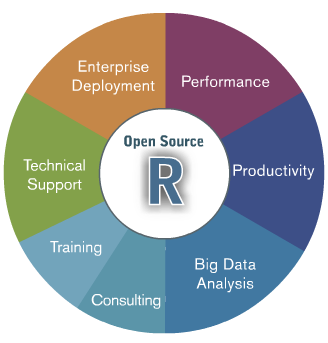
Revolution Analytics Sparks New Uses for R
R, which is the open source statistics language of choice for roughly 2 million data analysts worldwide, is Revolution Analytics’ bread and butter. As the top commercial provider of R packages and support, the company is keen on making sure that the language isn’t lost in the shuffle—and that data scientists are finding new uses for an old (well, 1990s) language.
 The language itself is experiencing something of a resurgence in popularity since its inception in 1993, in part because it allows statisticians and data analysts the opportunity to engage with a high-level language that doesn’t require intense training or computational know-how to manage. Additionally, the fact that it is open source (unlike rival products from SAS, for instance) doesn’t hurt either. Finally, in the era of big data, the flexibility of R might be just what the data doctor ordered.
The language itself is experiencing something of a resurgence in popularity since its inception in 1993, in part because it allows statisticians and data analysts the opportunity to engage with a high-level language that doesn’t require intense training or computational know-how to manage. Additionally, the fact that it is open source (unlike rival products from SAS, for instance) doesn’t hurt either. Finally, in the era of big data, the flexibility of R might be just what the data doctor ordered.
According to Ashlee Vance, “while SAS plays down R’s corporate appeal, companies like Google and Pfizer say they use the software for just about anything they can. Google, for example, taps R for help understanding trends in ad pricing and for illuminating patterns in the search data it collects. Pfizer has created customized packages for R to let its scientists manipulate their own data during nonclinical drug studies rather than send the information off to a statistician.”
In light of the goal to boost the appeal of R, today Revolution Analytics announced the victors for its “Applications of R in Business” contest, which sought to prove the value of the R language through innovative applications that can be used in business-critical settings.
 The company put forth $20,000 in total to dole out to a series of winners that spanned a number of industries, including those in insurance, airlines, manufacturing and pharmaceuticals. The top prize, which was $10,000 went out to Shannon Terry and Ben Ogorek from Nationwide Insurance.
The company put forth $20,000 in total to dole out to a series of winners that spanned a number of industries, including those in insurance, airlines, manufacturing and pharmaceuticals. The top prize, which was $10,000 went out to Shannon Terry and Ben Ogorek from Nationwide Insurance.
The insurance duo used the R statistics language to create a marketing efficacy forecasting tool for Nationwide that they say shows “the incremental benefit of a marketing tactic when only a fraction of the marketing responses have been observed.” This means that using R as the base, the company can use the solution to test new ideas and see how they fly in relation to ongoing marketing campaigns.
The runner-up used R to monitor tweets related to airlines and the satisfaction of their customers via the combo of R packages that “scored” tweets to produce clear and easy to read metrics of consumer sentiment. Other awards went to those who developed prediction models to gauge the timeliness and efficiency of clinical trials, as well as others who created predictive models to calculate the best temperature to handle all aspects of steel melting and manufacturing.
The team from Nationwide Insurance also received an honorable mention for their additional work in rendering accurate estimates of IT work effort, which is critical as the IT team at the insurance giant decides where in technology a business should invest.
This adds fuel to the Revolution Analytics fire that is spreading the word about how R is being used to power giants like the New York Times, Pfizer, Shell and Bank of America.
The full list of winners and descriptions about how they used the R statistical language in their industry can be found here.
Related Stories
New Techniques Turbo-Charge Data Mining
Doing the Math: The Future of STATISTICA
SAS Shifts Retail Analytics to HPC Platform



























